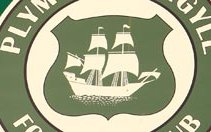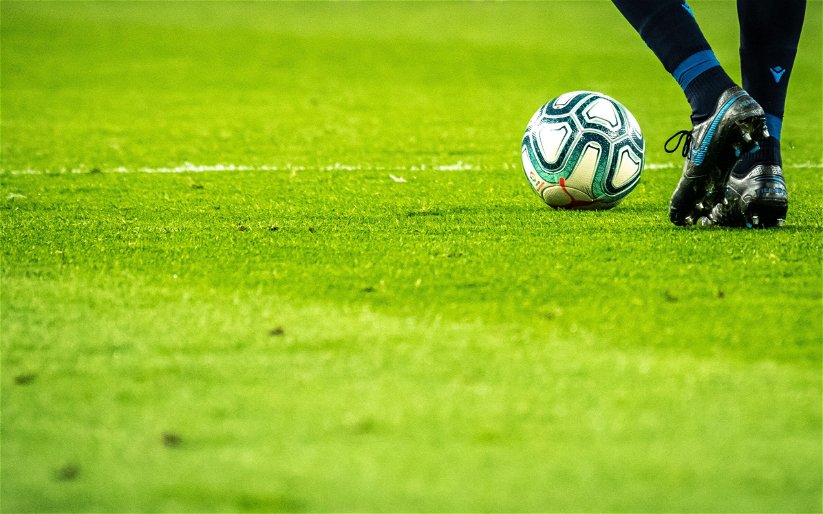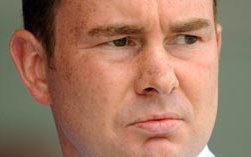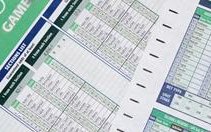Jimmy Gauld is the next player put under the spotlight for Peverell Green’s Where Are They Now series.
JIMMY GAULD – Born 9thMay 1929 Aberdeen, Scotland.
Younger fans may not even know his name but Jimmy Gauld was probably, well almost certainly, the most infamous player to have played for the club. More about his misdemeanours later.
Jimmy began his footballing career with his hometown club Aberdeen where he was selected to play for Scotland in a Youth International match against Wales.
Despite winning international honours he was released without making a first team appearance.
From Aberdeen he joined two Highland League teams playing first for Huntly and then Elgin City; he spent four seasons playing in the Highland League before his goals brought him to the attention of League of Ireland team Waterford.
Jimmy was an instant success in Ireland scoring 30 goals in his first season at the club, ending up as the league’s leading goalscorer and being selected to play for the Irish Free State, in 1954 against and English league team and in 1955 against a Northern Ireland league team.
His prolific goalscoring brought him to the attention of First Division (Premiership) team Charlton, with a bid of £4,000 securing his services for the London side.
A huge leap in playing standards didn’t stop Jimmy scoring goals, 21 in only 47 appearances.
Once again for the third time in three years he moved on, this time to Everton, also a First Division team for £10,500, where he played alongside future Argyle striker, George Kirby. For once goals didn’t come easily for Jimmy, scoring only seven from 21 appearances for the Merseysiders.
Even so it must have been a surprise for the football media when Argyle manager Jack Rowley, who had originally gone on a scouting mission to watch George Kirby put in a bid for Jimmy, and an even bigger surprise when he agreed to drop two divisions to join Argyle a Division 3 South team.
Jimmy made his debut on 26th October 1957 in a 3-0 defeat at Crystal Palace, he played his first game at Home Park the following Saturday announcing his arrival by scoring the only goal of the game in a 1-0 win over Devon rivals Torquay in front of 23,765 fans.
He scored again in the next home game, a 3-1 win over Bournemouth with Jimmy scoring in between two own goals.
On Christmas Day he scored Argyle’s second goal in a 2-0 win at Newport after George Baker had scored the first.
His final league goal in his first season at the club came in a 4-2 defeat at Exeter with Harry Penk also scoring. Jimmy also scored two FA Cup goals, he scored in a 6-2 rout of Watford at Home Park in the first round with Peter Anderson, Bernard Barnes (2) and Wilf Carter (2) also scoring.
In the second round, also at home, he scored in an easy 5-2 win over Dorchester with a Wilf Carter hat trick and one from Harry Penk ending the Dorset team’s hopes of an upset.
At the end of his first season he had scored a modest six goals from 22 appearances with his team finishing a credible 4th an improvement on the previous years 18th.
What was apparent to anyone who saw him play was his amazing speed, as a schoolboy he could run 100 yards in 10.3 seconds, and his tremendous close ball control. Abilities that would win the team many penalties as defenders couldn’t get out of the way as he raced into the penalty area, most of which were ruthlessly despatched by Wilf Carter.
The season started in a 1-1 draw away to Hull with Jimmy scoring the Argyle goal.
Argyle went through the first half of the season by losing only two games with Jimmy scoring regularly, he scored twice in a 3-2 home win over Swindon with Wilf Carter also scoring, and another two came at home to Newport in a 3-2 win after George Baker had scored the first goal.
On Boxing Day 30,036 saw Jimmy score twice in a 3-2 home win over QPR, Wilf Carter scoring the other goal. On February 28th he scored his first and only, hat trick for the club in a 4-3 away win at Swindon with Peter Anderson getting the other goal.
A week later Argyle demolished Mansfield 8-3, Jimmy scored one with Alex Govan, Harry Penk, Johnny Williams (2) Wilf Carter and two own goals completing the scoring.
The next Saturday Jimmy got both goals in a 2-1 win at Notts County, it was his 20th and 21st goals from only 33 games, but would be the last he would score for the club.
Even though Argyle finished the season as champions, Jimmy, to the dismay of the fans, decided to move on again after making 71 appearances scoring 28 goals.
A goalscorer of his ability soon brought interest from other clubs when they heard he was looking to move on, and a transfer to Swindon soon took place.
His legendary speed and goalscoring ability meant his new club had to pay a club record fee of £6,000 to secure his signature.
He continued to score for his new club, but for the first time doubts began to creep in about strange results that were beginning to occur. Initially he was on the end of season retained list, then after a directors meeting was taken off it.
While at Swindon he made 40 appearances and scored 14 goals.
A move back to Scotland followed when he joined St.Johnstone.
His time in Scotland was to be a short one, after only playing four games a bid came in from Mansfield and he moved back to England.
Jimmy made a good start at Mansfield, scoring in two of his first three matches, unfortunately after scoring a goal in his fourth game he suffered a badly broken leg and would never play football again.
Although that’s the end of Jimmy’s footballing career it wasn’t the end of his involvement in football, and it was an involvement that would prove catastrophic for the careers of a number of players.
It turned out that from his time at Swindon he had been bribing footballers to play badly in matches to affect the results and enable him to win a lot of money in betting scams, winning up to £1000 a week, considering the average wage was only £8 a week that was a lot of money.
Eventually it became obvious results were being manipulated and footballers were taken to court with Jimmy being implicated as the ringleader of a match fixing ring.
In November 1963 he was found guilty at Rochdale Magistrate’s court and banned from having any involvement in football for life.
Jimmy decided as he no longer had an income he would try for one last pay-day and contacted the Sunday People offering to tell the full story for £7000.
The papers investigation took six months to complete, as he went from player to player secretly tape recording conversations about bribes they had taken from him.
When the People published the story there was so much to report the story ran for four weeks implicating players from all levels of football, public interest was high as two of the accused were current England International players, Peter Swan and Tony Kay and also David ‘Bronco’ Lane who was tipped to play for England, and had played with Jimmy at Swindon.
The case was heard at Nottingham Assizes and when it ended in January 1965 Jimmy was sentenced to four years in prison and fined £5000, custodial sentences of various terms were handed down to the other players, with Swan, Kay and Lane each receiving four months in prison.
If anyone wants to know any more of the bribe scandal it is extensively covered in Steve Rhodes book of the Argyle championship season, ‘Thanks for the memory, Season 1958-59 Re-visited’.
Fortunately despite extensive investigations no evidence of match fixing was found during Jimmy’s time at Home Park.
Share this article
Related Articles
1 comment
Comments are closed.




Hell, he was a right crook back in the day, thankfully not while he was at Argyle.